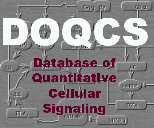
|
Enter a Search String | | Special character and space not allowed in the query term.
Search string should be at least 2 characters long. |
Molecule Parameter List for mGluR | The statistics table lists the distribution of a molecule acting either as a substrate, product, enzyme or as a molecule within the network.
The text color of a molecule is highlighted by  color. color. | | Statistics |
| mGluR participated as | Molecule | Sum total of | Enzyme | Substrate of an enzyme | Product of an enzyme | Substrate in Reaction | Product in Reaction | | No. of occurrences | 1 | 0 | 0 | 0 | 0 | 2 | 0 |
Accession and Pathway Details | |
| Accession Name | Accession No. | Accession Type | Pathway Link | MAPK_network_
2003 | 50 | Network |
Shared_Object_MAPK_network_2003, PKC, PLA2,
PLCbeta, Gq, MAPK,
Ras, EGFR, Sos,
PLC_g, CaMKII, CaM,
PP1, PP2B, PKA,
AC | | This is a network model of many pathways present at the neuronal synapse. The network has properties of temporal tuning as well as steady-state computational properties. In its default form the network is bistable.Bhalla US Biophys J. 2004 Aug;87(2):745-53 |
mGluR acting as a Molecule in MAPK_network_2003 Network
| Name | Accession Name | Pathway Name | Initial Conc.
(uM) | Volume
(fL) | Buffered | | mGluR | MAPK_network_
2003
Accession No. : 50 | Gq
Pathway No. : 210 | 0.3 | 1000 | No | | From M&L, Total # of receptors/cell = 1900 Vol of cell = 1e-15 (10 um cube). Navogadro = 6.023e23 so conversion from n to conc in uM is n/vol*nA * 1e3 = 1.66e-6 However, for typical synaptic channels the density is likely to be very high at the synapse. Use an estimate of 0.1 uM for now. this gives a total of about 60K receptors/cell, which is in line with Fay et at. |
mGluR acting as a Substrate in a reaction in MAPK_network_2003 Network
| Kd is calculated only for second order reactions, like nA+nB <->nC or nA<->nC+nD, where n is number and A,B,C,D are molecules, where as for first order reactions Keq is calculated.
Kd for higher order reaction are not consider. |
| | Name | Accession Name | Pathway Name | Kf | Kb | Kd | tau | Reagents | | 1 | RecLigandBinding | MAPK_network_
2003
Accession No. : 50 | Gq
Pathway No. : 210 | 16.8
(uM^-1 s^-1) | 10
(s^-1) | Kd(bf) = 0.5952(uM) | - | Substrate
Glu
mGluR
Product
Rec-Glu
| | | kf = kf from text = 1e7 / M / sec = 10 /uM/sec = 10 / 6e5 / # / sec = 1.67e-5 kb = kr from text = 60 / sec Note that we continue to use uM here since [phenylephrine] is also in uM. From Martin et al FEBS Lett 316:2 191-196 1993 we have Kd = 600 nM Assuming kb = 10/sec, we get kf = 10/(0.6 uM * 6e5) = 2.8e-5 1/sec/# | | 2 | Rec-bind-Gq | MAPK_network_
2003
Accession No. : 50 | Gq
Pathway No. : 210 | 0.6
(uM^-1 s^-1) | 1
(s^-1) | Kd(bf) = 1.6667(uM) | - | Substrate
G-GDP
mGluR
Product
Rec-Gq
| | | Lets try out the same kinetics as the Rec-Glu-bind-Gq This is much too forward. We know that the steady-state amount of Rec-Gq should be 40% of the total amount of receptor. This is for a different receptor, still we can try to match the value. kf = 1e-6 and kb = 1 give 0.333:0.8 which is pretty close. |
| Database compilation and code copyright (C) 2022, Upinder S. Bhalla and NCBS/TIFR
This Copyright is applied to ensure that the contents of this database remain freely available. Please see FAQ for details. |
|
